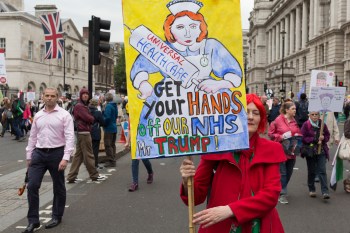U.K. health service in jeopardy
TEXT OF STORY
TESS VIGELAND:With all the talk of healthcare reform in this country, let’s get a checkup on how it works somewhere else.
In Britain, the government provides healthcare. But while it spends just over 9 percent of its GDP on health. Here in the US — it’s 17 percent. But there are now warnings that the UK system will face a nearly $25 billion deficit over the next decade.
Marketplace’s Stephen Beard has more from London.
Stephen Beard: Talk to people who use the NHS on a regular basis, like the people entering this doctor’s surgery in a small town west of London. And you hear a few grumbles: The time it takes to fix an appointment. The fact that the newest, most expensive drugs may not be available. But the overwhelming sense you get is that the NHS is one of Britain’s most cherished institutions
1st Voice: I think the NHS in this country is absolutely marvelous. There is nothing to match it in the world. Absolutely nothing.
2nd Voice: Oh, it’s very good as far as I’m concerned. Yes. It’s always treated me alright.
3rd. Voice: I think it’s very good. It looks after me. And at no cost.
And that is the key. The NHS — funded out of general taxation — offers largely free health care to all. That is the founding principle of the 61-year-old service, spelt out in 1948 by the prime minister of the day, Clement Attlee.
Clement Attlee: The aim is to ensure that a provision of proper care and treatment shall not depend on financial resources. And that when you are sick, you are free from the money worries that so often accompany illness.
Over the years, the ever rising cost of drugs and medical equipment and the increasing numbers of elderly people have put the NHS under pressure. Those pressures are now set to intensify. For seven years, the government has pumped in record amounts of cash. Now after all the bank bailouts and stimulus packages, the spending spree is grinding to a halt.
Within two years, says health service manager Nigel Edwards, the NHS will run out of money.
Nigel Edwards: This is probably one of the most significant financial challenges the NHS has ever faced in its financial history. Having had seven years of plenty it looks like having seven years of famine from 2011 onwards.
Various remedies have been suggested. One proposal: that patients should for the first time be required to pay to visit the doctor.
But Dr. Laurence Buckman of the doctors’ union, the British Medical Association, says no way.
Laurence Buckman: I can see enormous problems trying to take money off patients who’ve never paid before for anything to have to start charging them. I think family physicians would be very, very wary of that.
He says it would end up costing the NHS even more money. People would delay going to the doctor, their condition might worsen and then become even more expensive to treat. Dr. Buckman doesn’t believe big job cuts in the NHS make any sense either.
Buckman: Once you withdraw the workforce — although that’s the biggest expense in the health service — you actually remove the people who do the delivery of healthcare. So that doesn’t seem terribly bright.
Or politically palatable. Such is the British people’s fierce attachment to the NHS that any hospital closure provokes immediate protest. Even the most conservative politicians have learned that to cut the NHS is to commit electoral suicide. The Opposition Tories are even promising that if they win the next election, they’ll cut every other area of spending but not healthcare.
Niall Dickson is head of the think tank The King’s Fund. He says the NHS is largely untouchable. It’s now a bedrock of British life.
Niall Dickson: It’s like a compact between the whole society that says, “We believe there’s something fundamental and intrinsic about healthcare.” That it’s something people have a right to. And that we’re determined that whether you’re the rich man at the castle or the poor man at the gate, you will get the same and the highest possible service that we as a society can afford.
Some economies are inevitable. Some services like cosmetic surgery, fertility treatment and sex therapy may be massively reduced. Staff will have to work harder and smarter. There will be more contracting out. But no one seriously believe that the NHS will not survive its looming cash crisis, more or less intact.
In London, this is Stephen Beard for Marketplace Money.
There’s a lot happening in the world. Through it all, Marketplace is here for you.
You rely on Marketplace to break down the world’s events and tell you how it affects you in a fact-based, approachable way. We rely on your financial support to keep making that possible.
Your donation today powers the independent journalism that you rely on. For just $5/month, you can help sustain Marketplace so we can keep reporting on the things that matter to you.


















